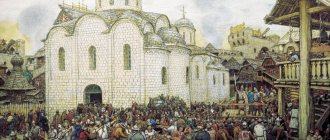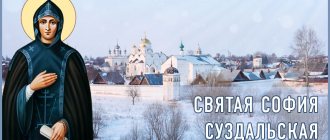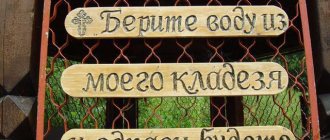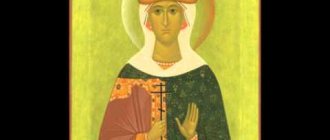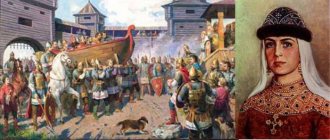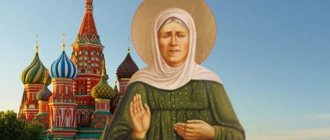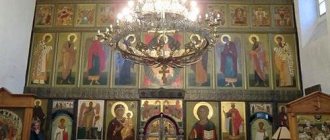Quotes from the Holy Fathers for every day
The Blessed Grand Duchess of Moscow Evdokia (monastically Euphrosyne) was the daughter of Princess Anna and the Grand Duke of Suzdal Dimitri Konstantinovich, who for a long time disputed the seniority of the throne with the young Prince of Moscow Dimitri, and finally, yielding to his strength, married him, still 15, his 13 -year-old daughter, and from a rival became a loyal ally. The marriage was the key to ending the internecine struggle between the Moscow and Suzdal-Nizhny Novgorod principalities and marked the final reconciliation of the two princes. The wedding took place in the Resurrection Church (one of the churches of the Kolomna Kremlin). They said about this happy marriage that “the Russian land was glad to see him.”viagra gegenanzeigenviagra kaufen
argaiv1076
The princess's richly gifted nature was beautiful, but her wisdom and piety even more surpassed her temporary beauty. In 1366, she became the wife of Grand Duke Dimitri Ioannovich, nicknamed Donskoy, and spent 22 years with him in a happy marriage, for which “the Russian land was glad.” This union was the key to ending the internecine struggle between two strong principalities. Young Demetrius was distinguished by many virtues: he did not like idle talk, did not tolerate shameful words, avoided bad people, but loved to talk with good people, listened to the Holy Scriptures with reverence, took care of churches, courageously stood guard over borders; “He was a child with malice, but a full man with intelligence,” as the ancient story says about him. The princess was a gentle, meek and pious wife. Both “lived purely in marriage, did not indulge in the aspirations of sensuality and were attentive to their salvation.”
There was someone to support their dispositions: Saint Alexy was the father and guardian of this union, Saint Theodore, abbot of Simonovsky and nephew of Saint Sergius, was their confessor. The princess raised her children in the fear of God. The successor of one of the sons was the Monk Sergius. The princess protected her husband with prayer and love in the fight against various sorrows; she prayed with him in the temple of the Archangel Michael before the battle with the hordes of Mamai. Throughout the entire campaign, she gave out a lot of alms to the poor and constantly went to church. Christian hopes did not remain disgraced: on the Nativity of Our Lady Theotokos, September 8 (21), 1380, Prince Dimitri won such a victory over the Tatars, after which Rus' was no longer afraid of the horde. The princess met her husband at the Spassky Gate, and all of Moscow honored its defenders.
The pious prince perpetuated the memory of the Battle of Kulikovo by establishing a memorial Saturday, called Dimitrievskaya. The Grand Duchess decided at the first opportunity to record her gratitude to the Mother of God for her protection in the most difficult battle of the Russians.
But “there was joy in Rus', but there was also pity - the land was depleted of governors and troops.” The exhaustion of the country brought the Tatars easy temporary success. Two years later, strengthened by the defeat of Mamai, Takhtamysh approached Moscow with a huge army. Dimitri went to Kostroma to gather regiments, and the princes of Ryazan, Suzdal and Tverskoy hurried to seek mercy from Takhtamysh, unrest and disputes began in the Kremlin: some stood for battle and resistance, others were preparing to plunder or flee out of cowardice. The Grand Duchess was barely released, and she, almost captured by the Tatars, reached Kostroma through Rostov. The Tatars burst into the Kremlin, killed the people, lit a fire and scattered for robbery in the surrounding cities, but as soon as they heard that the Grand Duke was leading the regiments, they hastened to get away from Russian borders. The prince and princess shed many tears when they returned to devastated Moscow, where up to 24 thousand people were buried at the expense of the prince. At a time of difficult trials, the princess, more than before, turned her thoughts to God. In 1383, her eldest son Vasily was detained in the Horde, and in the same year her father died. At this time, she “erected a most honorable maiden monastery inside the reigning city of Moscow, in the name of the Ascension of Christ our God,” it is written in the “Prologue.”
In 1389, the most severe sorrow visited the noble princess: Prince Dimitri was 39 years old, but he was so ill that he prepared a spiritual will. The princess has just given birth to her sixth son, and Dimitri asks her to be a “father and mother” to the children, to instruct and strengthen them in piety. His last word shows the hopes he placed in her intelligence and virtues. Having endowed them with inheritances, he bequeathed to his sons to obey their mother in everything, with her right of unaccountable authority to dispose of the inheritances in special cases. Having allocated her own lands, which she was free to give to one of her sons or for the remembrance of his soul. The chronicle preserved the words of her bitter cry over the coffin:
“Why did you die, my life, my dear, leaving me a widow? Why didn't I die before you? The light of my eyes has gone out. Where are you now, the treasure of my life? Why don't you talk to me, beautiful light of my eyes? Why did the abundant grapes wither so early? You will no longer give fruit to my heart and sweetness to my soul! Why don’t you look at me, say something to me? Have you really forgotten me? Why don’t you look at me and your children, why don’t you answer them? Who did you leave me with? My sun, you set early, my beautiful month, you faded early. Eastern star, why are you going to the west? (...) My clear light, why have you dimmed? If God hears your prayer, pray for me, your princess. I lived with you, and I want to die with you. And youth has not yet left us, and old age has not overtaken us. To whom do you leave me and your children? I did not rejoice with you for long: after the joy came weeping and tears, and after joy and joy came lamentation and weeping. Why didn’t I die before you, so as not to see your death and my destruction! Do you hear, my lord, my sad words? Why don’t you take pity on my bitter tears! The animals go into their holes, the birds of the air fly to their nests. You, sir, are leaving your home so suddenly. Who am I now? Left without her king. Old widows - comfort me, young widows - weep with me: a widow’s lot is the most bitter (...)"
Holyly fulfilling the will of the deceased, Evdokia did not retire to the monastery seclusion, according to the custom of princess widows, but headed the family. After the death of her husband, Evdokia Dmitrievna actually stood at the head of the Moscow principality, being the guardian of succession to the throne among her sons. She was one of the most educated women of her era. Her penultimate son Ivan soon died, but except for Vasily, the Grand Duke remained - Yuri, Andrei, Peter and the baby Konstantin. In memory of her dear husband, she built a stone church in her yard in honor of the Nativity of the Mother of God and decorated it with the best icons, utensils, and books. It was consecrated on February 11, 1393, in the presence of the entire family, by Saint Cyprian. Two years later, the Church of the Nativity was painted by the best icon painters - Theophan the Greek and Simon the Black. At the request of the pious princess, the victory on the Kulikovo Field was to be celebrated in Moscow on September 8 (21) with special solemnity. The princess generously lavished her funds on decorating and restoring the shrines destroyed by Takhtamysh. At her expense, the famous Ascension Convent (in wood), the Goritsky Monastery in Pereyaslavl, as well as the Church of the Nativity of John the Baptist in the same Pereyaslavl were built.
In 1395, Tamerlane was ready to do to Moscow the same thing that Takhtamysh did. The general horror could not help but disturb the princess mother; under the leadership of Evdokia Dmitrievna, a militia gathered to protect Moscow from the invasion of Tamerlane. She bitterly poured out her prayers to the Mother of God, so that She would save the city. When the enemy reached Yelets, on the advice of the princess and Saint Cyprian, the miraculous icon of the Vladimir Mother of God was transferred from Vladimir. Timur was frightened by the vision of Her in scarlet robes on a high mountain, surrounded by many formidable warriors. Tamerlane's hordes retreated, and the young prince, who dared to oppose the terrible enemy, returned with glory.
Meanwhile, the Christ-loving princess did not cease to apply new works to the previous ones, multiplying the virtues with which one can please God: she fed the poor, gave alms to the poor deserts, including Kirill Belozersky, and maintained strict fasting and abstinence. But in front of people, she did not change her feminine appearance and external splendor: she wore rich clothes, her face was always friendly, glowing with joy. The enemy, out of envy, aroused suspicion among several reckless people against the chastity of the immaculate widow. The bad rumor that reached the children insulted them, and Yuri Dimitrievich could not hide his feelings from his mother. Driven by love for her children, the mother broke the secret of her exploits. She called them together and exposed the withered, emaciated flesh, deliberately hidden by many clothes, while forbidding her sons to talk about what they had seen, and even more so to take revenge on the slanderers, leaving everything to God's court.
Soon there was a comforting phenomenon for her: the Lord himself sent His Angel to her to announce her imminent death. After that, she stopped speaking, but made it clear with signs that they should paint the face of an angel on her. The princess rejected the two filled faces; when she was presented with the image of the Archangel Michael, she was delighted and found the gift of speech, saying that the archangel appeared to her exactly in this form. She ordered this icon to be placed in the house church of the Nativity of the Virgin Mary.
The blessed princess did not want to stay any longer in the princely chambers, but wished to spend the rest of her days in the Ascension monastery she created. Her children and boyars from the cathedral church saw her off with tears. During the solemn procession, a blind man sitting on the way cried out loudly: “Oh, God-loving princess, nourisher of us beggars, you promised me in a dream: “Tomorrow I will give you sight,” - fulfill your promise.” The princess, walking past him, as if accidentally lowered the sleeve of her shirt, and the blind man, wiping his eyes with it, regained his sight. Up to thirty sick people were healed during Evdokia’s procession to the monastery for tonsure. She accepted the light yoke of Christ, putting on the monastic image, with the name Euphrosyne, laboring for some time in the monastery, where a stone church was built with her zeal, and rested peacefully on July 7 (20), 1407.
Her holy relics were placed in the new church of the Ascension Monastery, after the destruction of which in 1929, her remains were transferred to the basement of the Archangel Cathedral of the Kremlin.
On May 28, 2008, after the Liturgy in the Archangel Cathedral, performed by Patriarch Alexy II in the concelebration of the vicars of the Moscow diocese, her relics were transferred from the Judgment Chamber (the basement of the Archangel Cathedral) to the chapel of the martyr Huar.
The Lord sent many healings, filling the princess’s monastery with all sorts of blessings. The candle repeatedly lit up by itself over her coffin, as well as over the coffin of her faithful husband, thus signifying the heavenly light that she was awarded for the bright exploits of her temporary kingdom.
The Church celebrates the memory of the holy blessed princess on May 17 (30) and July 7 (20).
For a long time, in the Ascension Monastery, the service and akathist to St. Euphrosyne were performed using handwritten books. The abbess of this monastery, Sergia, twice submitted the manuscript to the Moscow Censorship Committee, and finally, in 1881, it was allowed to be published.
In 2007, the 600th anniversary of the repose of the Venerable Euphrosyne of Moscow was celebrated, in commemoration of which, on August 21 of the same year, a new award of the Russian Orthodox Church was established - the order and medal of the Venerable Euphrosyne, Grand Duchess of Moscow.
Early marriage in adolescence - to strengthen the peace of Russian princes
Nothing is known about the birth, childhood and youth of Evdokia. The daughter of Suzdal Prince Dimitri and his wife Anna, she grew up in Christian piety and purity. Torn civil strife between the princes darkened the life of the Russian people. For the political purpose of reconciliation, with the blessing of her parents, she was given as a wife to the Grand Duke of Moscow Dimitri Ivanovich.
Dmitry Ivanovich Donskoy, Evdokia's husband. Image of 1672 from the Tsar's titular book
The wedding took place with the blessing of St. Alexy of Moscow. The solemn wedding was celebrated according to the customs of those times in Kolomna.
The chronicler describes that this event “filled the hearts of the Russians with joy,” since the union between the Moscow and Suzdal principalities was of great political significance for the fate of Rus'.
18 January 1366
The marriage of Evdokia and Dimitri took place
Despite the fact that the first meeting of the spouses took place at a wedding, the love that kindled between them did not fade away throughout their earthly life.
The battle with Mamai and the invasion of Tokhtamysh is a test of the spirit and faith of Evdokia and the Russian people
According to the chronicler, the princess “experienced a little joy in her marriage to Dimitri.” One misfortune followed another. But all the adversities only strengthened Evdokia’s faith in Christ.
A new tribulation came in 1380. Mamai's army from the Golden Horde was advancing on Rus'. The plans of the conquerors include not only tribute, but also the destruction of temples and the inculcation of the Muslim faith.
St. Sergius gave his blessing to the war and victory over the enemy.
The monk sent two of his monks, Peresvet and Oslyabya, as warriors.
The princess shed many fervent prayers and tears, and St. Sergius of Radonezh also prayed. Through the zeal of the warriors' feat of arms and holy prayers, the battle ended with the defeat of the enemy. Almost all of the Prince of Moscow's squad fell on the battlefield. Dmitry Ivanovich Donskoy returned with a serious wound.
Painting by artist V.K. Sazonov “Dmitry Donskoy on the Kulikovo Field”, 1824 State Russian Museum, St. Petersburg
Evdokia, in honor of the victory on the Kulikovo Field, ordered the construction of a temple in honor of the Nativity of the Blessed Virgin Mary. The temple was built inside the Moscow Kremlin, and was painted by the great Russian icon painters Simeon the Black and Theophanes the Greek. The princess decorated it with expensive icons and church utensils, thereby fulfilling her promises to the Most Holy Theotokos for her help in the battle with Mamai. Since then, at the direction of Evdokia, the Victory has been solemnly celebrated on the Kulikovo Field.
The Russians did not rejoice about the victory for long. The new enemy Tokhtamysh turned most of the cities and villages into ashes. Prince Dimitri left to gather troops in Pereslavl and Kostroma. At this time, Moscow was taken and burned by Tokhtamysh’s cunning and deception. Evdokia and her children went to fetch her husband, thereby saving herself from death.
Siege of Moscow by Tokhtamysh. Miniature of the 16th century, front chronicle vault
The chronicler describes the state of Moscow after the invasion: “In what words will we depict the appearance of Moscow at that time? ... one day her beauty died; All that remained was smoke, ashes, bloody ground, corpses and empty burnt churches. The terrible silence of death was interrupted by one dull groan of some sufferers, cut by Tatar sabers, but not yet deprived of life and feeling.”
The prince cried over the ashes of Moscow. Evdokia consoled the disadvantaged and helped them as best she could.
For his money, Dmitry Donskoy buried 24 thousand Muscovites.
Another test awaited the princely family. In 1383, Tokhtamysh summoned the prince to confirm his reign. Instead of Dmitry, their 13-year-old son Vasily was sent to the Horde. For the release of his son, the khan demanded a ransom of 8 thousand rubles. At that time, the state did not have that kind of money. The son stayed in the Horde for 2 years, but he managed to escape. All this time the prayer of the Monk Euphrosyne did not dry out.
Invasion of Tamerlane. Why the Great Conqueror did not dare to attack Rus'
Another extraordinary event took place in Rus' with the name of Evdokia. A strong and formidable ruler appeared in the world - Tamerlane. He completely defeated the army of Tokhtamysh, and marched on Rus', wanting to raze it to the ground. The young Prince Vasily, having gathered a small army, boldly went to repel an enemy much superior in strength.
Evdokia remained reigning. Realizing that without God’s help the enemy could not be overcome, she ordered to bring the ancient miraculous image of the Vladimir Mother of God. When on August 26, 1395, the procession with the icon entered Moscow, all the people, from commoners to the Metropolitan of Moscow, were on their knees. On this day a miracle happened. Tamerlane, who never changed his decision, merciless even towards children, deployed his army and did not ruin Rus'.
According to legend, in a dream the Great Ruler saw a formidable heavenly army marching against Tamerlane from a high mountain. At the head of the army stood the saints with golden rods, and above them was the luminous Woman of indescribable greatness. His wife ordered Tamerlane to leave the Russian lands. The terrible ruler woke up in horror and ordered the troops to retreat.
A physically weak, suffering woman, the Moscow princess, saved Rus' with her prayers to the Mother of God.
Dmitry Donskoy and Evdokia had a real Christian marriage, in which they gave birth to 12 children
Throughout their lives, Evdokia of Moscow and Dmitry Donskoy relied on God’s providence. They were guided by the wise advice of St. Sergius of Radonezh, who baptized Dmitry himself and his two children. The great Russian saint, Metropolitan Alexy, took part in the fate of the family. He took care of Demetrius from infancy, and replaced his earthly father. Evdokia's confessor is the abbot of the Moscow Simonov Monastery, Saint Feodor, a disciple of St. Sergius.
A contemporary of the life of the Grand Ducal couple, the chronicler writes: “The wise man also said that the loving soul is in the body of the beloved. And I am not ashamed to say that two such people carry one soul in two bodies and both have one virtuous life; they look at future glory, raising their eyes to heaven. Likewise, Demetrius had a wife, and they lived in chastity. Just as iron is heated in fire and tempered with water so that it is sharp, so they were inflamed by the fire of the Divine Spirit and purified with tears of repentance.” It was a real Christian marriage.
In her marriage to Prince Dmitry, Evdokia gave birth to eight sons and four daughters.
Sons Daniel and Semyon died in infancy. Son Ivan, who according to some sources was weak-minded, died without leaving any offspring in 1393.
Five sons - Vasily, Yuri, Andrey, Peter and Konstantin - grew up to be strong, energetic people, endowed with considerable ambition. It took the mother a lot of work to maintain peace in the family. More than once, she must have reminded her brothers of the words from Dmitry Donskoy’s will: “And you, my children, listen to your mother in everything, do not act against her will in anything. ...And my young children, brothers of Prince Vasilyev, honor and listen to your elder brother, Prince Vasily, in my place, your father. And my son, Prince Vasily, keeps his brother Yury and his younger brother in brotherhood, without offense.”
Princess Evdokia honored her husband's dying will. The brothers never took up arms against each other, despite disagreements over land.
